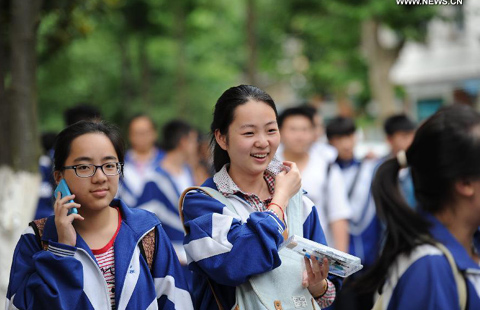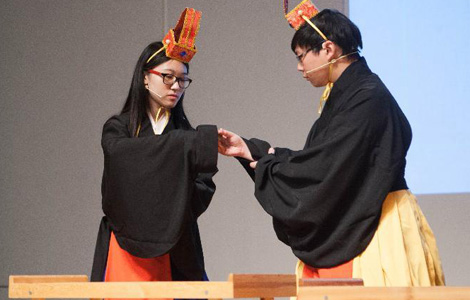Suu Kyi visit to boost ties with Myanmar
Updated: 2015-06-09 10:56
By Song Qingrun(chinadaily.com.cn)
|
||||||||
|
Aung San Suu Kyi, the chairperson of Myanmar's National League for Democracy, attends the National League for Democracy Party's central comity meeting at a restaurant in Yangon December 13, 2014. [Photo/Agencies] |
Aung San Suu Kyi, the chairperson of Myanmar's National League for Democracy (NLD), is visiting China as the head of a delegation from Myanmar from June 10 to 14 at the invitation of the Communist Party of China (CPC). On her first visit to China, Suu Kyi is scheduled to meet top Chinese leaders Xi Jinping and Li Keqiang.
The NLD leader's visit comes just months before the general election in Myanmar, which is undergoing a rapid democratic transition in which the parliament, opposition parties and citizens are expected to play a greater role in their country's relationship with China in the backdrop of more than a dozen cooperation deals signed by the two countries last year.
For many in Myanmar, the lack of grassroots and party-to-party exchanges between China and Myanmar and some Western media outlets' biased reports against China have created many misunderstandings. To further strengthen China-Myanmar ties, therefore, both governments should encourage more non-governmental players to participate in bilateral communications.
In this sense, Suu Kyi's visit to China is very important for CPC-NLD ties and the overall relationship between Beijing and Naypyidaw, especially because of her and her party's friendly attitude toward China.
NLD delegations have visited China more than once in the past with the aim of improving China-Myanmar ties. Should Xi and Suu Kyi meet, as scheduled, they will help strengthen party-to-party dialogues and people-to-people exchanges between the two countries.
Besides, the misconceptions between Chinese and Myanmarese people are likely to reduce after Suu Kyi spends five days meeting Chinese people from all walks of life thanks to her political influence in her homeland.
Suu Kyi's first visit to China and the firsthand information she will get about the country are likely to be covered by Myanmarese and other foreign media outlets. This will not only help more Chinese people to get a better understanding of Suu Kyi, her party and her country, but also help Myanmarese people realize that China is in favor of Myanmar's democratic progress and economic development.
Ideally, Suu Kyi's itinerary should take her and her delegation to regions that have been playing the leading roles in China's reform and opening-up and provide more information to them about Chinese enterprises that have invested in Myanmar. Her visit is also likely to give her a glimpse of China's policies on ethnic minority communities. Also, it will help Chinese investors work for the well-being of Myanmarese people, in a bid to strike more cooperative deals.
More important, the visit will help Suu Kyi to gather more information on China's resolve to safeguard border security and understand that China doesn't support the rebels in the domestic conflict in the northern part of Myanmar.
Making China's policy of non-interference in other countries' internal affairs is important to not only removing doubts, but also boosting cross-border trade, which has the potential to alleviate poverty and thus rebellion against the Myanmarese government.
Of course, China's invitation to Suu Kyi does not mean it accords less importance to other parties in Myanmar, including the ruling Union Solidarity and Development Party. In fact, the USDP shares a close relationship with the CPC. In essence, Beijing will continue to have cordial ties with the USDP and other opposition parties to strengthen China-Myanmar ties despite the political changes in Naypyidaw.
The author is an associate researcher on South Asia and Southeast Asia studies at China Institutes of Contemporary International Relations.

 Yes, we are waiting for our children
Yes, we are waiting for our children
 Chinese artist to be recognized at International Muse Awards
Chinese artist to be recognized at International Muse Awards
 2015 Apple WWDC kicks off in San Francisco
2015 Apple WWDC kicks off in San Francisco
 Ten photos you don't wanna miss - June 9
Ten photos you don't wanna miss - June 9
 National college entrance exam ends in most parts of China
National college entrance exam ends in most parts of China
 Peking University opens Chinese traditional art courses
Peking University opens Chinese traditional art courses
 Rescuers mourn victims on seventh day since Eastern Star disaster
Rescuers mourn victims on seventh day since Eastern Star disaster
 Rescuers enter Eastern Star hull in search efforts
Rescuers enter Eastern Star hull in search efforts
Most Viewed
Editor's Picks

|

|

|

|

|

|
Today's Top News
Prove hacking: experts
Amid tensions, top Chinese brass visiting US
Apple reveals plan to develop all-platform eco-system empire
Video of officer who drew gun on black teens raises tension
Suu Kyi visit to boost ties with Myanmar
China gives its yuan to Broadway
Questions remain unresolved in the cruise ship disaster
Escaped New York prisoners may have had help from staff
US Weekly

|

|





